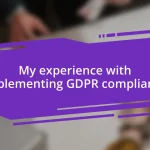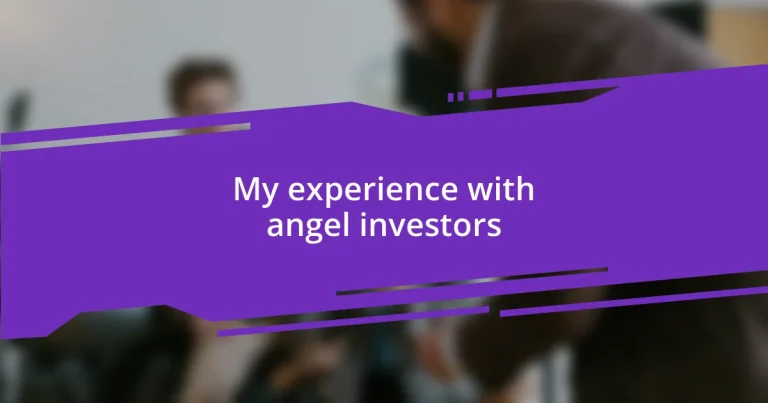Key takeaways:
- Establishing a genuine relationship with angel investors is crucial; it fosters trust and can provide valuable mentorship alongside financial support.
- Preparation for investor meetings, including researching investors and practicing pitches, is essential for effective communication and connecting emotionally with potential backers.
- Maintaining open communication and nurturing investor relationships, through regular updates and transparency, is vital for building strong, supportive partnerships.
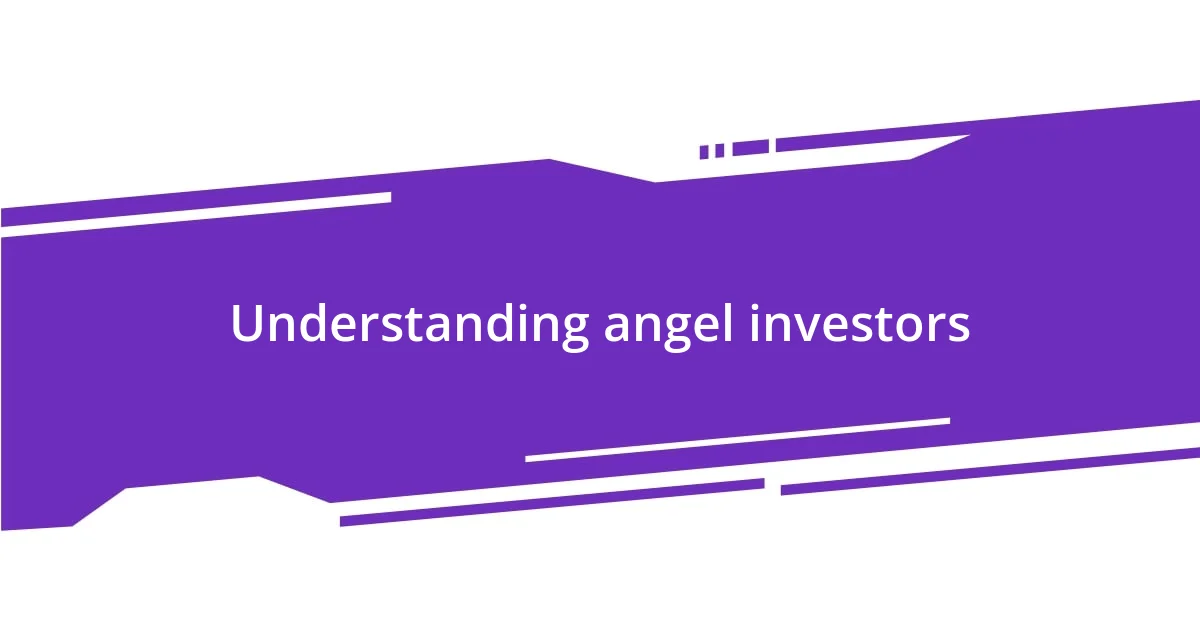
Understanding angel investors
Angel investors are individuals who provide financial support to startups, often in exchange for equity. I recall my first encounter with an angel investor; I was both excited and nervous. It felt like stepping into the unknown, yet I realized this was an opportunity to gain not just capital but also invaluable mentorship.
From my experience, what sets angel investors apart is their genuine interest in nurturing entrepreneurial talent. Many have been in your shoes—facing uncertainty while chasing big dreams. Have you ever wondered what drives them to invest? For me, it became clear that their motivations often stem from a desire to give back, leveraging their own success to help budding entrepreneurs turn their visions into reality.
As I navigated the world of angel investment, I discovered that building a relationship with these investors is crucial. It’s not just a transaction; it’s a partnership built on trust and shared passion. Remember, when you engage with an angel investor, you’re opening a door to not just financial backing, but guidance that can significantly impact your journey. Isn’t it reassuring to know that someone who’s walked the path before you believes in your potential?
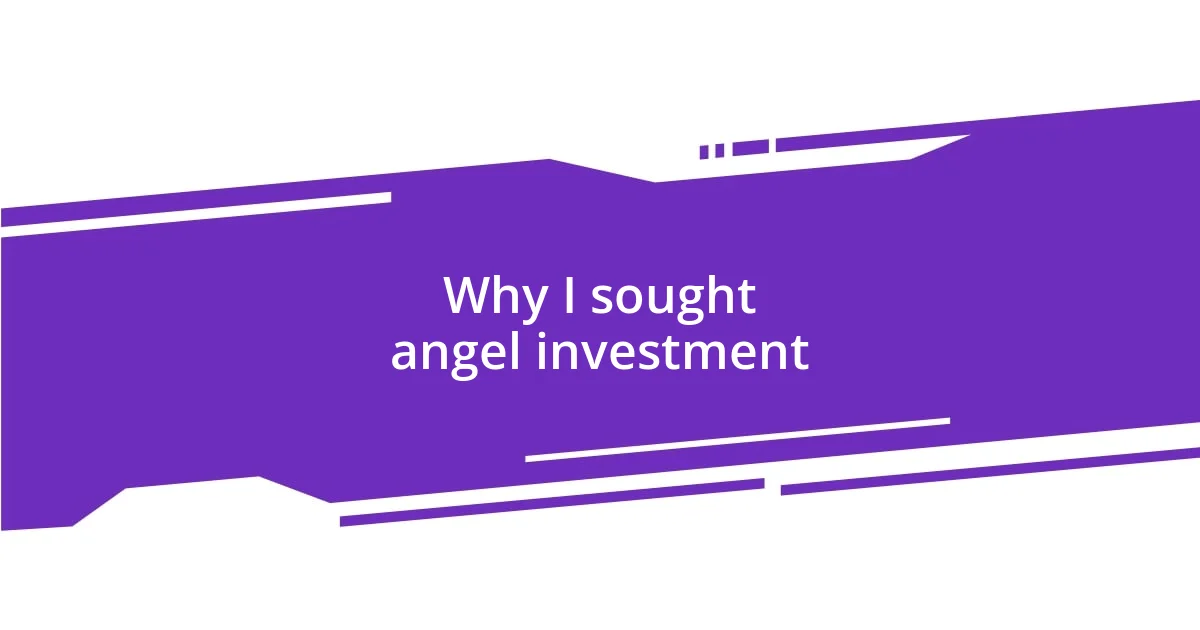
Why I sought angel investment
Seeking angel investment was a turning point in my entrepreneurial journey. I had a vision that I was passionate about, but without the necessary funds, it felt like a dream on hold. The allure of accessing not just financial resources but also mentorship drove me to make that leap. I often reflect on how those early conversations with potential investors ignited a fire in me, pushing me to articulate my ideas more clearly and confidently.
Another reason I sought out angel investors was the network they bring with them. I remember sitting in a café, discussing my business plan with an investor. It wasn’t just about securing funds; I felt like I was being inducted into a community of like-minded individuals. The possibility of tapping into their contacts, skills, and insights was invaluable. Have you ever thought about how much faster you can grow with the right people in your corner? For me, it was an opportunity to break through barriers that felt insurmountable just a few months prior.
Lastly, the flexibility that angel investors often provide was incredibly appealing. Unlike traditional bank loans, their investment terms can be more accommodating. I’ll never forget the moment when I received my first check; it was a mix of disbelief and gratitude. This financial support wasn’t just about money; it was a validation of my efforts. It reminded me that my journey was moving forward, and I had allies cheering for me. That support made all the difference in transforming my passion into a viable business.
| Aspect | Angel Investment |
|---|---|
| Capital Access | Immediate funds without lengthy loans |
| Mentorship | Guidance from experienced entrepreneurs |
| Network Expansion | Access to valuable industry contacts |
| Flexibility | More adaptable investment terms |

Preparing for investor meetings
Preparing for investor meetings has its own set of challenges, but it’s also a pivotal opportunity. I remember spending countless hours perfecting my pitch. The pressure was real; I aimed to communicate my passion and vision within a limited time frame. By the end of these sessions, I realized that preparation is more than just rehearsing my speech—it’s about understanding my audience. Knowing what makes angel investors tick can set the stage for a successful interaction.
To ensure you’re fully prepared for investor meetings, here are some essential steps to consider:
-
Research the Investor: Understand their past investments and interests. It’s crucial to tailor your pitch to what they value.
-
Clarify Your Business Model: Be ready to explain how your business operates, generates revenue, and what makes it unique.
-
Practice Your Pitch: Rehearse your presentation multiple times. The more comfortable you are, the better you’ll engage with the investor.
-
Prepare for Questions: Think through potential questions and objections they might raise. This will help you respond confidently.
-
Have Financial Projections: Being able to present realistic projections not only shows you’re prepared but also signals professionalism and foresight.
-
Build a Strong Team Slide: Investors often invest in teams as much as in ideas. Highlighting your team’s strengths can instill confidence in your ability to execute.
Each meeting I attended became a learning experience. I found that sometimes, the best insights came not from my talking but from actively listening to feedback. Armed with this knowledge, I’ve entered subsequent meetings with greater confidence, and it transformed the way I connect with potential investors.

Pitching to angel investors
When I first stood in front of angel investors, a whirlwind of emotions hit me. I vividly remember the nervousness dancing in my stomach while desperately trying to focus on my key points. Each investor’s gaze felt like a spotlight, pushing me to articulate not just the numbers but the passion behind my vision. What if they didn’t connect? That question buzzed in my head, reminding me that pitching is so much more than just a presentation; it’s about storytelling. Conveying the “why” behind my business, made a huge difference in how they perceived my proposal.
In one memorable meeting, I shared a personal story about how my journey began. I spoke about the challenges I faced and what drove me to create a solution to a problem close to my heart. I could see eyes light up around the table, and suddenly, it felt like we were having a genuine conversation rather than a formal pitch. I realized then that vulnerability is a strength in pitching. Have you ever noticed how people connect more when they can feel your story? That connection often translates into trust, making investors more inclined to support your venture.
After my pitches, I always sought feedback, eager to improve. One investor suggested I simplify my visuals, and to this day, I remember their words: “Complexity can drown your message.” Their insight pushed me to rethink my approach and present information clearly and concisely. Looking back, I truly believe that each interaction taught me a new lesson, sharpening my skills for the next opportunity. Each pitch became a stepping stone, shaping my ability to connect with those who hold the keys to making aspirations a reality.
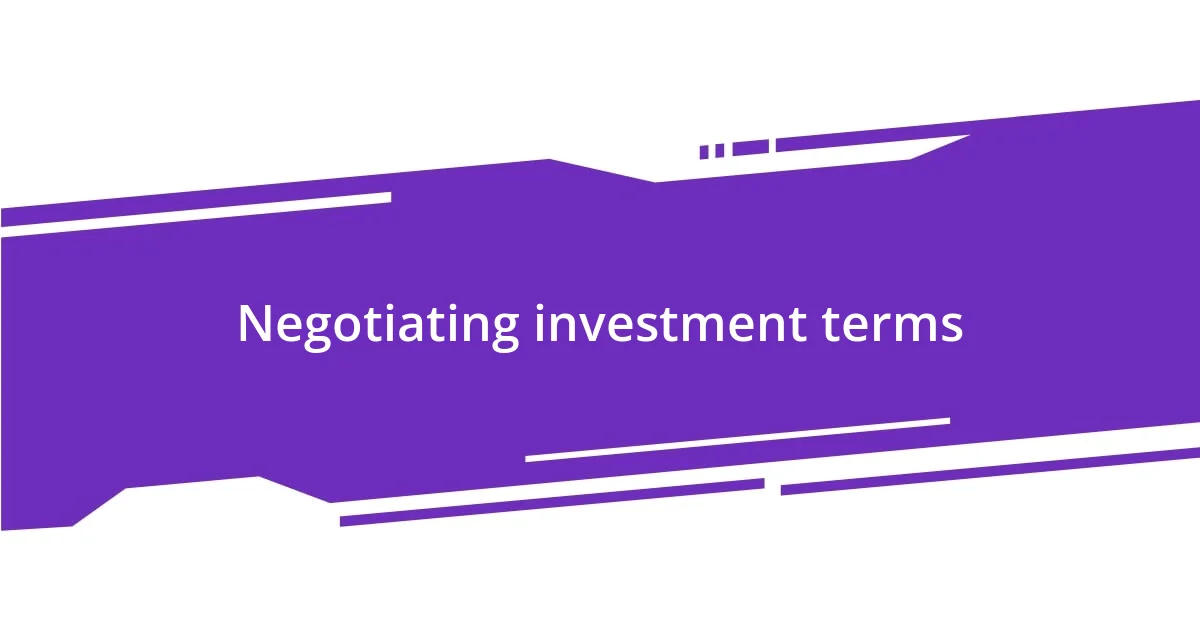
Negotiating investment terms
Negotiating investment terms can often feel like a dance, and in my experience, it’s all about finding the right rhythm. I remember a particular instance where I had to navigate the fine line between asserting my valuation and being open to the investor’s insights. At one point, I found myself wondering: How much am I willing to compromise without losing my vision? This internal dialogue pushed me to clearly define what terms were non-negotiable for me, such as equity stakes and control.
When it came time to discuss specific terms, I discovered the importance of being transparent. I recall being in a negotiation meeting where I laid out my financial projections alongside my funding needs. By openly sharing my numbers, I could see how the investor began to engage more deeply. It’s fascinating how transparency builds trust; by inviting them into my financial world, we were no longer just negotiating, but collaborating towards mutual benefit.
Finally, I learned that it’s vital to listen to the investor’s perspective. One potential investor suggested an adjusted exit strategy that I hadn’t considered. Initially, I was resistant, thinking of my own vision first. But, challenging myself to consider their advice allowed a fresh perspective. It made me realize: what if their experience could actually lead to a stronger partnership? Engaging in a back-and-forth, rather than simply digging in my heels, opened doors I hadn’t anticipated. Through trial and error, I found that effective negotiation is often more about dialogue than disagreement.
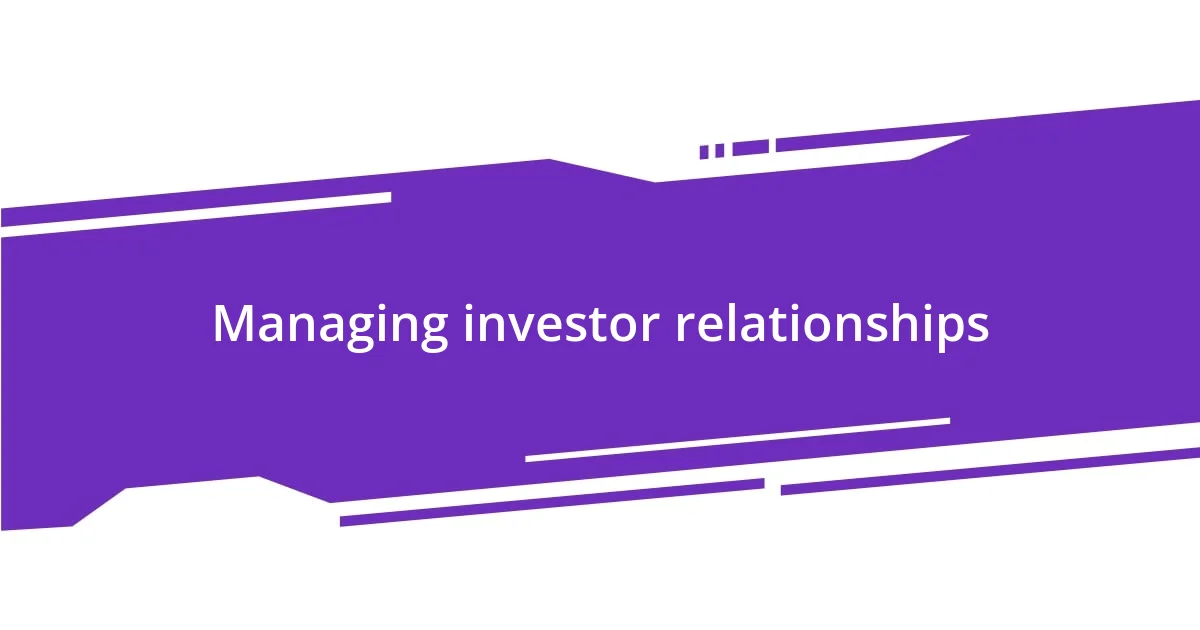
Managing investor relationships
Managing investor relationships is an art that I’ve gradually mastered, and it requires a mixture of communication and empathy. Early on, I learned the importance of regular updates. I vividly recall a time when I went silent for a few weeks after securing funding, thinking that my investors were content with our progress. However, when I finally reached out, I sensed a hint of unease. Keeping that dialogue open is crucial; it not only reassures investors but also fosters a sense of partnership. Have you ever considered how a simple message can build strong ties?
An unexpected lesson came during a quarterly review meeting. I thought the numbers would speak for themselves, but the investors were eager to understand the human side of the story behind the figures. It clicked for me then—numbers might capture attention, but emotions build connections. From that point on, I made it a priority to share both the triumphs and the challenges, allowing my investors to feel like active participants in my journey. This transparency has transformed how they see me—not just as a business owner, but as someone they are genuinely allied with.
Looking back, the most valuable lesson I’ve learned is that relationships require nurturing. I recall spending a good part of one afternoon simply chatting with an investor over coffee, discussing not just business but also our shared interests. I walked away feeling more connected with them, which ultimately paid off when I needed advice on a difficult decision later. Investing time in these relationships can be just as important as closing deals. After all, don’t you think that strong relationships can be the lifeblood of any venture?

Lessons learned from my experience
Through my journey with angel investors, I’ve come to appreciate the delicate balance between confidence and humility. I vividly remember facing a challenging moment during a pitch when I found myself overly focused on showcasing my achievements. It hit me afterward—was I really connecting with the investors, or was I merely performing? This taught me that acknowledging gaps in my knowledge or experience can be just as powerful as highlighting successes. It’s about being authentic and inviting them into my journey, not just broadcasting my accomplishments.
Another significant lesson emerged from an unexpected twist during a funding round. One investor raised concerns about scalability that I hadn’t fully considered. At first, I felt defensive. But rather than shutting down the conversation, I paused and reframed my approach. I asked them about their experiences with similar challenges. This not only transformed my mindset but also fostered a constructive dialogue that ultimately led to deeper insights. Have you ever felt that a critical question from an investor turned into a valuable lesson? I learned that their inquiries can serve as a mirror, reflecting aspects of my business that may need adjustment.
Lastly, I realized the power of shared values can be a foundation for solid partnerships. I once worked with an investor whose passion for social impact mirrored mine. They were not just another financial backer; they genuinely cared about the mission. This alignment made the relationship feel more like a collaboration. It became clear to me that when values resonate, it could turn challenges into joint problem-solving sessions rather than conflicts. How important do you think shared values are in building long-term investor relationships? For me, it transformed the entire experience and brought meaning to every interaction.











